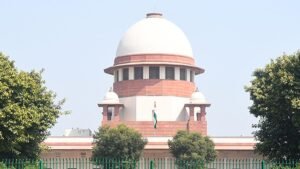
Why in news?
- The recent verdict by the Supreme Court of India regarding the disclosure of assets by election candidates has sparked a debate on the balance between transparency and privacy in electoral processes.
- This blog explores the key aspects of the case, the significance of the right to privacy, the relevant provisions of the Representation of People Act (RPA), 1951, and the implications for Indian democracy.
Understanding the Case:
- The Supreme Court addressed a petition filed by an MLA from Arunachal Pradesh challenging the nullification of his election for not declaring three vehicles as assets in his affidavit.
- The petitioner argued that the non-disclosure of certain assets did not constitute a “corrupt practice” under Section 123 of the RPA, 1951.
Key Judgments:
- The court ruled in favor of the candidate, emphasizing the candidate’s right to privacy and the voters’ right to essential information for informed voting.
- It clarified that non-disclosure of assets not relevant to the candidacy does not amount to a corrupt practice or a substantial defect under the RPA, 1951.
Understanding the Right to Privacy:
- The right to privacy is a fundamental right protected under Article 21 of the Indian Constitution.
- It safeguards individuals from interference by both state and non-state actors and enables autonomous decision-making.
- The Supreme Court affirmed the right to privacy in the landmark Puttaswamy case of 2017, emphasizing its intrinsic connection to personal liberty.
Provisions of the RPA, 1951:
- The Representation of People Act, 1951, governs the conduct of elections and sets qualifications and disqualifications for elected representatives.
- It aims to ensure the legitimacy and fairness of electoral processes by curbing corrupt practices, settling disputes, and promoting transparency.
Corrupt Practices under the RPA, 1951:
- Section 123 of the Act defines corrupt practices to include bribery, undue influence, false information, and promoting enmity between citizens based on religion, race, caste, or language.
- It prohibits candidates from appealing for votes on religious grounds and prohibits undue influence hindering free electoral exercise.
Significance of the RPA, 1951:
- The RPA, 1951, plays a crucial role in maintaining the integrity of Indian democracy.
- It prevents the entry of candidates with criminal backgrounds, mandates asset disclosure, and regulates election expenses to ensure transparency and accountability.
- Additionally, it prohibits corrupt practices to uphold the legitimacy and fairness of elections.
Implications for Indian Democracy:
- The Supreme Court’s ruling reaffirms the importance of balancing transparency with privacy in electoral processes.
- While ensuring voters’ access to essential information, it also protects candidates’ privacy rights.
- This balance is essential for preserving the integrity and credibility of democratic institutions.
Conclusion:
- The Supreme Court’s judgment on candidate disclosure underscores the significance of the right to privacy in the electoral context.
- By clarifying the scope of asset disclosure and corrupt practices under the RPA, 1951, the court has reaffirmed the principles of transparency, accountability, and fairness in Indian democracy.
- Moving forward, it is imperative to uphold these principles while respecting individuals’ privacy rights in electoral processes.
People also ask
Q1: What was the recent Supreme Court ruling regarding election candidate disclosure?
Ans: The Supreme Court ruled that election candidates are not required to declare every movable asset they possess, as candidates also have a right to privacy.
Q2: What prompted this ruling?
Ans: The ruling was prompted by a petition filed by an MLA from Arunachal Pradesh challenging the nullification of his election for not declaring certain assets in his affidavit.
Q3: What does the ruling mean for election candidates?
Ans: The ruling clarifies that candidates have a right to privacy, and non-disclosure of assets not relevant to their candidacy does not constitute a corrupt practice under the Representation of People Act, 1951.
Q4: What is the significance of the right to privacy in this context?
Ans: The right to privacy ensures that individuals, including election candidates, are protected from unwarranted interference in their personal affairs, while also enabling informed decision-making by voters.